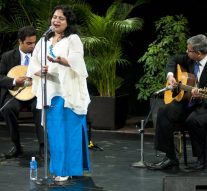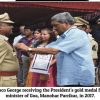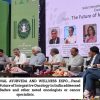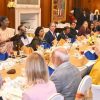Goa is abuzz with excitement as vintage bike and car owners, users, collectors and fans are decking […]

Changing Sound of Goa’s Music
Uncategorized October 17, 2025By Praveena Sharma
Goa’s music landscape has, lately, seen a surge in disc jockeys (DJs) and electronic dance music (EDM), but that’s not waning the popularity of live music
In the 80s, the 90s and even up till early 2000, a trip to Goa was never complete without a dine-out with live music – while you chewed on your fish curry and rice or other Goan delicacies, a music band strummed for you Western retro and pop music, throwing in some popular Konkani and Portuguese songs.
That was the unique Goan experience. The bond between Goans and music is symbiotic. It begins from childhood, and church choir plays a big role in it all. Practically, every Goan would have played a musical instrument some time or other in his life.
And so, it comes as little surprise the tiny State has produced so many singers and musicians – from Lata Mangeshkar to Jose Antony Gonsalvas (of Amar Akbar Antony fame), Remo Fernades, Hema Sardesai, Lorna Cordeiro, Linda Diniz Braganza and so many others.
Goa offered a distinct blend of music, mixing traditional tunes with modern and Western styles. One thing that stood out about the State’s music was its openness to experiment. This produced new and inventive music, but they never let go of the old.
Lately, a tectonic shift is taking place on Goa’s music landscape. And, this is visible to anyone who is closely watching the music of Goa. DJ Ashton, popularly known as Fusion Tribe and who has been performing at all the major nightclubs in the State, says; “Goa’s music scene is evolving rapidly, blending traditional with modern style”.
He added; “the state’s rich cultural heritage, influenced by Portuguese colonization, has created a unique sound. Modern Influences are shaping Goa’s music landscape. Goa Trance, a genre born in the 1990s, has given rise to psychedelic trance (Psytrance), attracting global enthusiasts”.
Fadista Sonia Shirsat, who has contributed immensely in popularising Fado – a Portuguese style of singing characterised by lyrical expression – around world, is also cognizant of turning pages of Goa’s music.
“In recent years, there has been a very nice turn in Goa’s original music. Be it English or Konkani, there is a lot of young talent that has come out with very original stuff, which was not happening in earlier times. I would term ‘earlier times’ as before Covid. I find Goa’s music has taken a particular direction in recent times,” said internationally renowned fadista.
Both – Ashton and Shirsat – agree Goa’s tradition of live music is not being edged by the new music trend.
“While live music is still thriving, the rise of electronic dance music (EDM) and DJs have undoubtedly changed the landscapе. However, live music remains an integral part of the (Goa’s) music ecosystem, offering unique experiences and emotional connections with audiences,” emphasises Ashton.
Even the Fado singer doesn’t see the popularity of live music performances waning; “there is a demand for live music at eateries, hotels, local public and private events by people who are visiting Goa and locals. Live music cannot be eliminated in Goa”.
The fadista shared she and her students are perennially being flooded with requests for live performances. Fado – introduced by Portuguese in Goa more than a century back – has seen a revival in recent years. Not only Goans but even the globally exposed “cultured audience” visitors to Goa enjoy listening to Fado at live performances.
“I wouldn’t agree with the statement that techno music, EDM or other modern music are killing live music in Goa. Today, you can go to places, buy a ticket and listen to Fado. You have once-a-month live Fado happening at Cidade Goa and a live Mando at Madragoa. Today, you can actually go and listen to Mando and Fado live at these two venues. This wasn’t happening 20-25 years ago,” says Shirsat.
Dr Francisco Colaco, famous cardiologist who loves to croon Western classics, says the new musicians are applying modern sound techniques to cater to the taste of their younger audience. He said even the sound system of church choir has evolved in the recent years.
Ashton says Goa is a hub of experiential music and “its unique cultural identity continued to inspire artists, both locally and globally”.
Music is in the veins of every Goan; “being a Goan has definitely influenced my music journey. Growing up in Goa, I was surrounded by music culture from a young age. Goa’s rich cultural heritage and history of Portuguese influence have created a unique blend of a traditional and Western music styles. This exposure has helped shape my sound and inspired me to explore different genres”.
He alluded to church choir playing a significant role in Goa’s music. Like him, most Goan youth are fuel by the ambition of becoming Disc Jockey (DJ) today.
He started his career at the popular clubs in Goa – Club Tito’s, Club Mambos, Butter Pub – and eventually began playing at music clubs like Cohiba, Cavala and Thalassa. Ashton’s big break came when he won the All India Foster DJ Mastermix Contest. Today, he is the most sought DJ, known for his “versality and ability to keep the party going until the early hours of the morning”.
Success stories of DJs, such as that of Ashton, are rife in Goa, fueling young Goans with ambition to pursue similar musical journey. And this is changing musical landscape and story of Goa.















